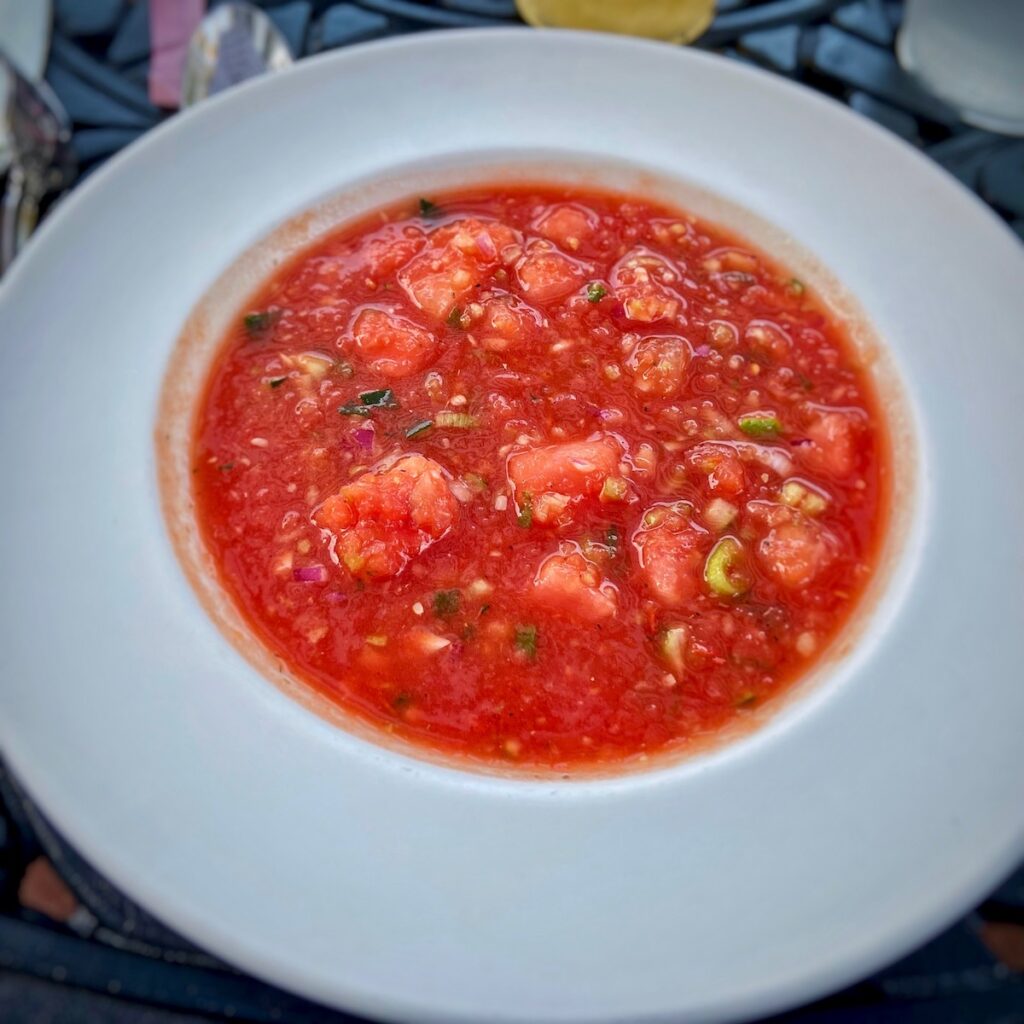How to Make Watermelon Gazpacho at Home
Few dishes refresh like a chilled bowl of watermelon gazpacho on a hot summer day. This vibrant soup combines the sweet juiciness of ripe watermelon with the savory punch of tomatoes, cucumbers, and peppers.
Blended with olive oil, vinegar, and a touch of seasoning, this simple yet elegant dish offers a light and flavorful start to any warm-weather meal.
You can prepare watermelon gazpacho in just minutes—no stove required. The key lies in selecting the freshest ingredients.
Choose a watermelon that feels heavy for its size with a deep, hollow sound when tapped. Pair it with vine-ripened tomatoes, crisp cucumbers, and sweet bell peppers to build layers of flavor.
This soup tastes even better after a short chill in the refrigerator, which allows the flavors to meld beautifully. Garnish it with fresh herbs or a sprinkle of feta for added contrast and texture. Serve it as a refreshing appetizer, a light lunch, or an elegant starter at your next summer gathering.
In this post, I’ll guide you through the simple steps to create watermelon gazpacho at home. You’ll soon see why this cool, colorful soup belongs in your summer recipe rotation!
Watermelon Gazpacho
Equipment
- Blender
Ingredients
- 28 ounces plum tomatoes canned with juices
- 28 ounces vine ripe tomatoes peeled and seeded
- 28 ounces ripe watermellon medium diced
- 12 ounces red onion fnely diced
- 12 ounces cucumber peeled, seeded and finely diced
- 2 ounces lime juice freshly squeezed
- 1 ounce fresh cilantro finely shredded
- 4 ounces celery finely diced
- 1 tablespoon kosher salt
- ½ tablespoon blck pepper
- 12 ounces red bell pepper finely diced
- 1 tablespoon crushed red pepper flakes
- 1 cup olive oil extra virgin
- ½ ounce fresh basil finely shredded
- tobasco sauce to taste
Instructions
- Start by blending the plum tomatoes and half of the vine ripe tomatoes to a fairly smooth consistency.
- Fold in the remainder of the vine ripe tomatoes, watermelon, diced red onion, cucumber, lime juice, bell pepper,celery, salt, black pepper, e.v.o.o., and basil Pulse a few times to break everything up.
- Add your crushed red pepper flakes and cilantro taste and add your tobasco to taste.
Notes
Tips For Making Watermelon Gazpacho
Tip | Description |
| Choose ripe watermelon | Select a watermelon that feels heavy for its size, has a deep yellow field spot, and sounds hollow when tapped for optimal sweetness and flavor. |
| Balance sweet and savory | Use enough tomatoes, cucumber, and bell pepper to balance the watermelon’s natural sweetness. |
| Use high-quality olive oil | Choose a fruity, extra-virgin olive oil for richness and depth of flavor. |
| Add acidity | A splash of good sherry vinegar or red wine vinegar brightens the soup and enhances the flavors. |
| Season generously | Don’t be shy with salt and pepper—seasoning brings out the natural sweetness of the fruit and vegetables. |
| Blend well | Blend ingredients until very smooth for a velvety texture, or pulse for a chunkier version if preferred. |
| Chill thoroughly | Refrigerate the gazpacho for at least 2 hours to allow the flavors to meld and to serve it well chilled. |
| Garnish with contrast | Top with herbs, crumbled feta, diced cucumber, or a drizzle of olive oil for visual appeal and extra texture. |
| Taste and adjust | Taste before serving and adjust seasoning or acidity as needed to balance flavors. |
| Serve cold | Always serve well chilled for the most refreshing effect. |
Garnishing Ideas
Garnish | Why It’s a Good Addition |
| Fresh mint leaves | Adds a bright, cooling contrast to the sweetness of the watermelon. |
| Crumbled feta cheese | Provides a salty, creamy counterpoint to the fresh flavors of the soup. |
| Diced cucumber | Enhances texture and reinforces the crisp, refreshing qualities. |
| Thinly sliced radishes | Brings a peppery bite and crispness for added depth. |
| Chopped fresh basil | Adds a sweet herbal note that complements watermelon and tomatoes. |
| Extra-virgin olive oil drizzle | Adds richness and silkiness to the finished dish. |
| Microgreens | Offers a delicate texture and a visual pop of color. |
| Toasted pumpkin seeds (pepitas) | Introduces a nutty crunch that contrasts the smooth soup. |
| Pickled red onions | Brings acidity and a little tang for a more complex flavor profile. |
| Chopped chives or scallions | Adds a mild oniony bite that balances the sweetness. |
What is Gazpacho?
Gazpacho is a traditional cold soup that originated in Andalusia, a region in southern Spain. It dates back to ancient times, when Roman soldiers and laborers prepared simple mixtures of stale bread, olive oil, vinegar, garlic, and salt to refresh themselves in the intense heat. These early versions were white or pale in color, as tomatoes had not yet arrived in Europe.
With the introduction of tomatoes and peppers from the Americas in the 16th century, gazpacho gradually evolved into the bright red soup we recognize today. Over time, Andalusian cooks added raw vegetables like cucumbers, onions, and bell peppers, blending everything into a smooth, chilled dish that made use of fresh summer produce.
Gazpacho became a staple in Spanish cuisine, celebrated for its cooling qualities and healthful ingredients. It spread from Andalusia to the rest of Spain and eventually to kitchens around the world. While the classic version remains beloved, modern interpretations include variations with fruits, different vinegars, and creative garnishes.
Today, gazpacho continues to embody the spirit of Spanish hospitality—simple, refreshing, and perfect for sharing. Whether served as an appetizer, a light lunch, or a party starter, this timeless dish brings a taste of sunny Andalusia to your table.













